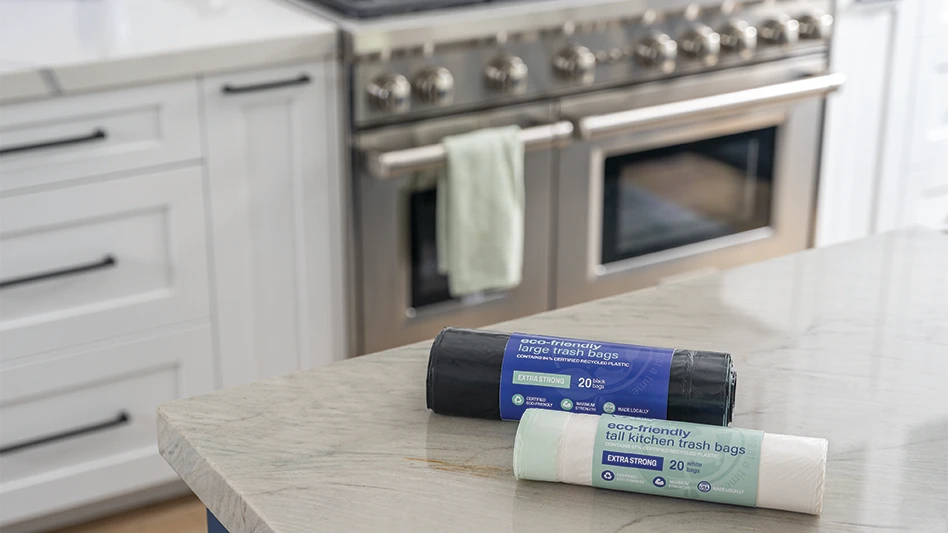
Photo courtesy of Revolution
Little Rock, Arkansas-based film recycling company Revolution has launched Dailygood Bags, which it says are the most eco-friendly heavy-duty trash bags made for everyday household use.
The bags are made with as much as 97 percent-postconsumer-recycled (PCR) plastic, the company says, resulting in lower environmental impacts compared to trash bags made without recycled content.
RELATED: Revolution acquires PolyAg Recycling
Revolution says the average American family creates 18 pounds of trash daily, and 100 billion bags made from virgin plastic are sent to landfills every day. To create its Dailygood offering, Revolution collects and recycles PCR from sources such as U.S. farms to create what it claims are the most durable, eco-friendly, commercial-strength trash bags for the home.
The bags are made with its proprietary Sustainable Loop business model that helps to keep local communities and businesses free of plastic scrap that would otherwise be buried or sent to landfills. The Bags come in two sizes—13-gallon tall kitchen drawstring and 30-gallon large drawstring—and are available in a variety of pack sizes online for $10-$20 per pack. The bags soon will be available at Amazon.
Subscription options and bundled sets are available. To sign up for Dailygood’s subscription services, visit here.
In a news release, Revolution says the new bags are stronger than the industry average consumer bag because they originally were designed for commercial use, which makes them heavier-duty and more durable to ensure the bag will hold up to everyday wear and tear without ripping. The bags are tested to hold up to 90 pounds, with a convenient drawstring closure that allows for easier removal and disposal and ensures a better fit on standard household trash can sizes.
“PCR trash bags from Revolution have been used by global businesses including stadiums, airports, universities, restaurants and hospitals for over a decade to help keep their facilities clean while also achieving their ESG [environmental, social and governance] and sustainability goals, and now we are making the same commercial quality bags available for the home with Dailygood Bags,” Revolution CEO Sean Whiteley says. “We are proud to offer the most eco-friendly trash bags on the market and that consumers now have easy access to the most sustainable trash bag options available.”
The products are made at Revolution facilities throughout the U.S. and have received third-party certification by SCS Global Services, verifying the quality and consistency of its recycled materials. Revolution says it also had SCS conduct an independent life cycle assessment (LCA) to measure the specific environmental impact of the bags. Results included:
- 53 percent less depletion of nonrenewable energy resources/fossil fuels such as crude oil;
- global climate change emissions lowered by 37 percent;
- decreased human exposure to ground level ozone and fine particulate matter such as smog (31 percent reduction) and soot (50 percent reduction);
- a 12 percent reduction in impacts to regional acidification;
- a 31 percent reduction in ocean warming; and
- a 51 percent reduction in ocean acidification.
Revolution has multiple recycling facilities where plastic is transported, sorted, processed, recycled and turned into its certified PCR resin, which then is used to manufacture new plastic film products including Dailygood Bags. The company says the vertically integrated process allows it to ensure the quality of its PCR and its trash bags since it knows where the plastic comes from and can manage the entire plastics life cycle.
The company’s fleet of collection vehicles and proprietary Push for Pick Up mobile app allows it to locate used plastic film—much of it its own products—to ensure Revolution can efficiently collect the material once it’s been used.
Latest from Recycling Today
- Unifi launches Repreve with Ciclo technology
- Fenix Parts acquires Assured Auto Parts
- PTR appoints new VP of independent hauler sales
- Updated: Grede to close Alabama foundry
- Leadpoint VP of recycling retires
- Study looks at potential impact of chemical recycling on global plastic pollution
- Foreign Pollution Fee Act addresses unfair trade practices of nonmarket economies
- GFL opens new MRF in Edmonton, Alberta






